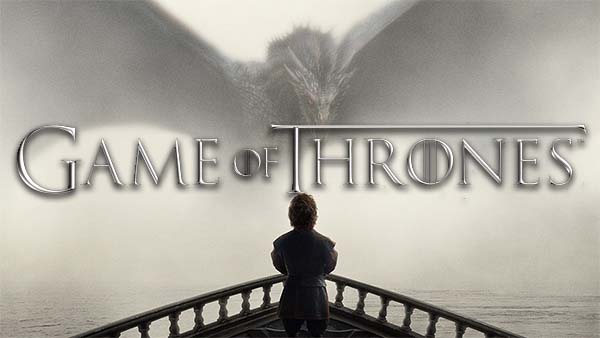
I've been seeing a lot of mixed reaction to the most recent season of HBO's Game Of Thrones (season five). Many sources on the internet have referred to it as the slowest and most boring season of the series so far. And episode six (Unbowed, Unbent, Unbroken) has been reviled as one of the worst episodes of the series due to the sexual assault of poor Sansa. Anecdotally, the people who I know who watch it (including my girlfriend, who got me into the show to begin with) have been disappointed by the apparent uneventfullness of this season. Another friend even said he was likely going to give up on the show completely because he's sick of the show dragging on and then suddenly doing things apparently only for shock value. I think his reaction is a bit extreme.
On the other hand, this season's eighth episode, Hardhome has been received as the best episode of the series so far.
But now that the season is over, and the shocks have been given, it puts the entirety of the season into perspective - at least for me.
The whole of Game of Thrones' fifth season has an over-arching theme of fatalism and futility. And the final episode shifted both of those themes to full-blown self-implosion. Every major character in every theater of operations made very self-destructive choices. And they all suffered for it, and those that survived will continue to suffer into season six. This season also may have shifted long-standing opinions on who are the favored characters and factions, which could be a deliberate attempt to ramp up the tension for a more conflict-filled sixth season.
All the major agents self-destruct
Season five started with numerous characters and factions at the height of their power. Daenerys, Stannis, Ramsey, and John Snow all had enormous successes at the end of season four and start of season five. The Lannisters may have suffered a severe blow at the end of last season, but their grip on King's Landing was still firm at the start of season five. They all manage to blunder these successes into utter failures by the end of season five.
Stannis Baratheon sacrifices his humanity, loses everything
Probably the most immediately obvious case of self-destruction is Stannis. While most of the season looked as though he was putting himself in a position of strength and was primed to recapture Winterfell, he was also falling victim to the classic Napoleon / Hitler mistake: he tried to invade a tundra empire at the onset of winter. As successful as his actions were in the first half of the season, there was always a feeling of impending dread and desperation hanging over him and his army.
Even those of us who were won over by Stannis' actions at the wall, and his hearftful defense and expression of love for his deformed daughter, must've recognized that he seemed fated to fail.
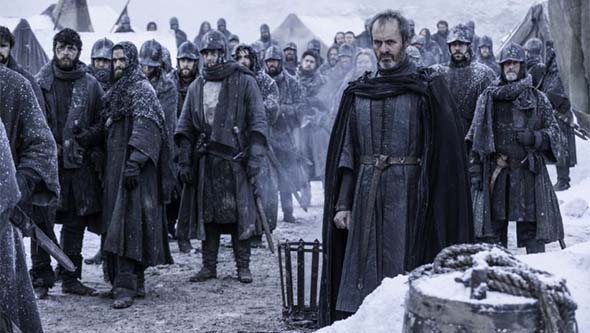
How could anyone follow a man who would do what Stannis has chosen to done?
Stannis cements his doom with quite possibly the worst, and most heartless decision that any character has made in the show to date: sacrificing his daughter to the God of Light on the promise that it would guarantee victory against the Boltons. This decision costs him everything. Just as the viewers certainly lost faith in him after this decision, so does his own army. By the next morning, half his army has deserted, and they've taken his horses. After all, who can trust a man who burns his own daughter at the stake? That same morning, he also finds his wife has hanged herself. He's lost everything. But he doesn't turn back. Perhaps because he's lost everything that was worth protecting, he proceeds to march on Winterfell, only to be crushed by Ramsey's army (possibly using the very horses and mercenaries that deserted from Stannis).
Stannis has brought this on himself, and his defeat is well deserved.
Stannis' own actions lead to mutiny among his soldiers and condemns him to absolute failure.
Cersei Lannister puts herself at the mercy of religious fundamentalism
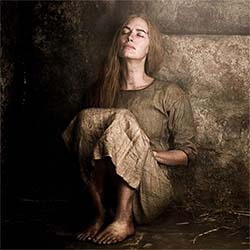
Cercei gets herself thrown in jail and humiliated
by the High Sparrow she put in power.
Another character who's self-destructive tendencies finally catch up with her is Cersei. Her compulsion to hurt her perceived enemies (in this case, Margaery and the Tyrells) bites her in the ass. She raises up a religious zealot and allows him to prosecute Margaery for the sins that her family has committed. She doesn't realize that the High Sparrow's zealotry knows no bounds. He will stop at nothing to do what he feels is the will of the gods, even if it requires operating against the crown. Cersei gives him the power to do this.
Either she thinks that she can control the High Sparrow, or she somehow thinks that she is immune from her own sins and the sins of her family - the very same sins that she sicks the High Sparrow on Margaery for. On top of that, she is dependent on King Tommen's incompetance and passivity preventing him from doing anything to protect his wife. But the High Sparrow's conviction and Tommen's weakness ends up condemning Cersei to the same fate that she imposes on Margaery.
Daenerys Targaryen bites off more than she can chew
On the other side of the Narrow Sea, the next biggest set back was with Daenerys Targaryen. Her righteous mismanagement of Meereen has finally bubbled over into outright revolt. She went so far out of her way to prop up the former slaves and antagonize the former slave masters that she has pitted the city into civil war between the two factions. The Sons of the Harpies have enough power to be able to hide from the Unsullied and even defeat them in open combat in the streets.
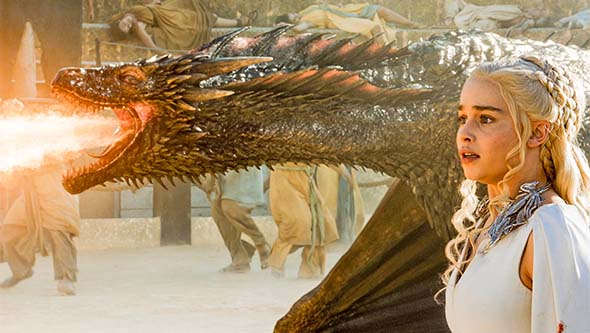
Daenerys' mismanagement of Meereen resulted in her needing Drogon to save her from imminent death.
If Drogon hadn't shown up to sweep her away to safety, then she would probably be dead. And only the fear of the dragon scattered the rebels and allowed Tyrion and the others to escape.
Daenerys has clearly lost control of the city, and has been effectively banished for the time being (and possibly a hostage to a Dothraki clan). Her failures are now Tyrion's problem.
John Snow doesn't recognize sedition in his midst
It seemed like John Snow was building himself quite a coalition at the Night's Watch this season. He became the leader of the organization, won the trust of the Wildlings, and seemed to have discovered a great threat that would unite the antagonist parties against a common foe. It seemed like he was going to become an influential leader in the Seven Kingdoms. The White Walker threat could even give John (being the leader of Night's Watch) authority over the crown itself.
John Snow and his associates also discovered the weaknesses of the White Walkers: they are vulnerable to dragon glass and Valyrian steel. This established that the people could potentially defeat the White Walkers, instead of just having to hold the Walkers back until the end of winter.
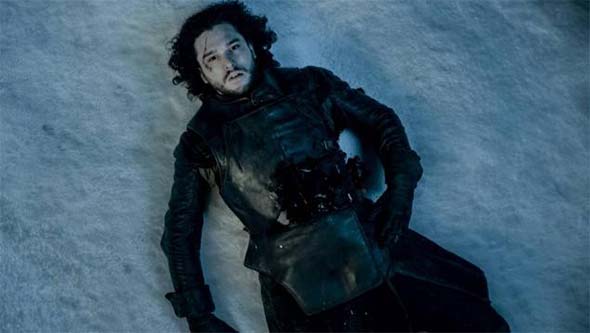
John Snow fails to recognize how much he's alienated the other members of the Night's Watch.
Much like with Daenerys failed to anticipate the resentment of the former slavers, John Snow fails to realize just how deeply his "alliance" with the Wildlings was alienating other members of the Night's Watch, or just how resentful his opponents were becoming. He surrounded himself with "yes" men like Sam, Aemon, and even Stannis (to an extent) and rarely paid attention to his political and personal rivals. He even dismissed the resentment that was building in one of his previous friends, Olly.
In the end, his political opponents get the better of him, and he suffers one of (if not the) most surprising deaths of the entire series so far.
Arya Stark fails her No-one initiation
Yet another character spent the entire season sabotaging herself: Arya Stark. She refused to truly give up her rapier when joining the Cult of the Many-Faced God, and she remains unwilling to throw away her former identity and desires.
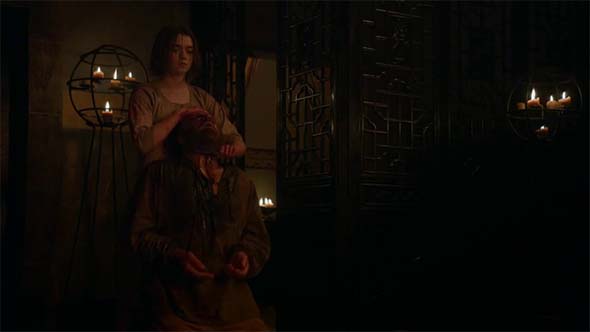
Arya sacrifices her status with the Many-Faced God by assassinating a personal target.
Yet she goes through with the training and initiation anyway, even becoming good enough at lying to convince her mentor to put her on a mission. But she sees an opportunity to take vengeance on someone who had wronged her before, and she neglects her assigned mission in order to kill Ser Meryn. Of course, the other No-ones know what she's done, and they punish her with a crippling handicap: blindness.
Ellaria Sand makes Jamie Lannister's quest is futile
One of the smaller side plots of the series, but one of the threads that has the potential to be most impactful in season six, is the result of Jamie Lannister's quest to return his and Cercei's daughter to King's Landing. Hers is one of the happier stories in Westeros. She is promised to a prince of Dorne in order to forge a state of peace and possible alliance. Unlike other arranged marriage, her husband is kind and loving, and she is happy.
But the death of Oberyn has left Ellaria Sand bitter, even though her brother, Prince Doran is committed to peace. Her war-hawkish behavior put a constant threat of war over her interactions, even though Doran worked so hard to assure Jamie of Dorne's peaceful intentions. Her desire for revenge against the Lannisters got the best of her, and she has perhaps thrown away any chance at peace by assassinating Myrcella with a "kiss of death".
Ellaria's kiss of death may plunge Dorne into war with King's Landing.
Jamie's entire season five plot thread becomes basically moot. He was sent to Dorne to avoid war, and despite all his efforts (and the efforts of Doran), war is likely going to come. Cercei has now lost two of her children and her father, and she's been publicly humiliated by the High Sparrow. Assuming that she has any pride left to wound (I'm sure that she does), then she will see Ellaria's actions as an act of war and will seek revenge.
War between King's Landing and Dorne may now be unavoidable.
Perhaps if Bronn weren't so distracted by Tyene, he would've stopped Ellaria from kissing Mercella, since he should have known that they utilize a "kiss of death".
Brianne of Tarth fulfills an oath to the dead, but fails an oath to the living
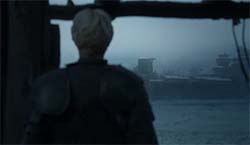
Brianne goes after Stannis instead of
continuing to watch for Sansa's signal.
A smaller incident of tragic failure involves Brianne of Tarth. She spent the entire second half of the season camped out near Winterfell waiting to charge in and rescue Sansa. But when Stannis' army showed up, she abandoned this task, just at the time when Sansa was able to give a signal. Instead, she wastes her time and breaks her promise to the living (and in danger) Sansa in order to finish off Stannis - something that Ramsey and his army (or the Winter) probably would have done anyway.
Ramsey Bolton loses his wife and his claim on the Warden of the North
Last, but not least, there is one other character who seemed to have everything going his way: Ramsey Bolton (formerly Ramsey Snow). He has been adopted by the Boltons and given the rule of Winterfell. He's been married to Sansa in order to cement his legitimacy over Winterfell and his status as Warden of the North. And he even benefits from Stannis' complete self-destruction.
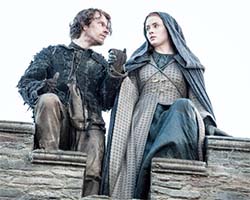
Ramsey has lost his claim to
legitimacy as Warden of the North.
There are virtually no threats to Ramsey's position. Except for one: Roose Bolton's wife may be pregnant with a son. A true heir could potentially de-legitimize Ramey's authority. To make matters worse, his abuse of his wife, and cruelty to Theon/Reek has resulted in her fleeing the city (and possibly killing herself if she didn't survive the fall). Now he doesn't have anything left to legitimize his claim to the title Warden of the North.
Perhaps he shouldn't have been such a complete monster...
And now, he has the Wildlings settling in the north, and the inevitable threat of the White Walkers to deal with.
The de-polarization of season five's agents
The purpose of season five was to build up all of these aforementioned characters, and then brutally tear them down. The people who seemed to be gaining the most power and influence are now either dead, banished, or had their positions left vulnerable to both internal and external threats.
Season five seemed considerably slower than previous seasons, and [anecdotally] the people that I've talked to say that it has been their least favorite season of the show so far. I don't know how representative this is of the fanbase in general, but I can definitely see how people would feel that way.
I think that the slowness of this season was due primarily to the consequences of the previous season. The sinking of Stannis' fleet, the death of Rob Stark at the "Red Wedding" and the Bolton's assumption of control in the North limited the number of active parties that were fighting for the crown. The Lannisters had nearly uncontested control of King's Landing going into season five. The only threat to that was Stannis, but he still had to rebuild his forces and contend with the Boltons, who were effectively subservient to the Lannisters and not an independent entity. Even Dorne and the Tyrells aren't openly competing with the Lannisters.
The conflict for the crown was polarized essentially to just two parties: the Lannisters and Stannis. Stannis wasn't in a position to directly challenge the Lannisters, so the Lannisters didn't have to worry about it. The whole "game of thrones" part of Game of Thrones was kind of at a standstill.
Because of these narrative elements, this season didn't have much active conflict. And in fact, it was even devoid of a lot of the subterfuge that was so prolific in the earlier seasons. This season was all about showing us what happens when the individual agents are kind of left to their own devices; how, without outside threats bearing down on them, they are all self-destructive by nature. This season exposed Stannis and John Snow as ineffective leaders, incapable of managing the complex relationships and responsibilities that they would need to juggle (and then promptly killed them). It also finally put a chink in Daenerys' noble leadership. She wasn't strong or clever enough to maintain the moral high ground and overcome the threat of the Sons of the Harpy, and her smug moral superiority finally cracked under the pressure of the moral corruptions of Meereen.
Blurring the line between hero and villain
Previous seasons had a much clearer line between who was "good" and who was "bad". Joffrey and Cercei were clear villains. Daenerys and John Snow were paragons of virtue and leadership.
Joffrey and Cercei [LEFT] were clear villains; while Daenerys [RIGHT] was a virtuous hero who seemed infallible.
Now, Joffrey is gone, and Cercei is humbled (in much the same way that Jamie was humbled and made into a much more likable character). We still have Ramsey to hate, but the characters that we loved are now either dead or revealed to be less capable (and possibly less worthy) than we thought.
If season five did anything, it made us question who are the good guys, and who are the bad guys? After all, by episode eight, who in their right mind wanted Ramsey to defeat Stannis? Heck, who wasn't rooting for Stannis to actually win the Iron Throne? But after episode nine, was anybody still rooting for Stannis? And if you were, you were probably only rooting for him to take Winterfell (but not the Throne), and it was probably only because he was the lesser of two evils (the enemy of Ramsey Bolton is my friend).
Perhaps now, we want to see the White Walkers overtake The Wall and defeat the Night's Watch now that John Snow is murdered, Sam is gone to become a maester, and Allisor is in charge.
Maybe now, we might root for Cercei to outmaneuver the High Sparrow and end his reign of fundamentalist witch hunts. And now that Myrcella's death has re-cast the Lannisters as victims, maybe we'll even root for them in the inevitable conflict with the child-murdering Ellaria of Dorne.
And maybe we even want to see Tyrion usurp Daenerys' power and be the leader of Meereen.
The conclusion might have been shocking, and you might even think it was all done for sheer shock value. But it was all for good reason. The show ran the risk of becoming stale, and it needed a shake up in the major players in order to prevent fans from getting too comfortable with their personal favorite characters. Now, everything has been shaken up, and we'll be going into season six without a clear picture of who we want to succeed and who we want to fail.